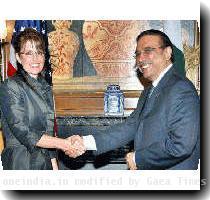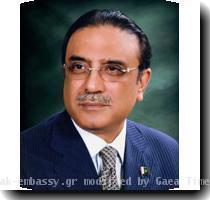Police say explosion hits central Pakistani city of Multan near an intelligence office
By APTuesday, December 8, 2009
Police: Bomb hits Pakistan city near intel office
MULTAN, Pakistan — Police say a bomb has exploded near an intelligence office in the central Pakistani city of Multan.
Police official Mohammad Qasim says casualties are feared in the Tuesday blast.
Militant attacks have bedeviled Pakistan over the past two months as Islamist extremists retaliate against an anti-Taliban army offensive in the country’s northwest near the Afghan border.
This is the first time Multan has been hit during a surge of violence that began in October and has already killed more than 400 people in the U.S.-allied, nuclear-armed nation.
THIS IS A BREAKING NEWS UPDATE. Check back soon for further information. AP’s earlier story is below.
ISLAMABAD (AP) — Suspected U.S. missiles killed three people in a Taliban-riddled northwest region early Tuesday, intelligence officials said, as Pakistanis reeled from a day’s worth of bombings that killed at least 59 in the U.S.-allied, nuclear-armed nation.
The bombings signaled a relentless determination on the part of the militants, who — despite being pressured by a major army offensive along one of their Afghan border strongholds — have sustained a retaliatory campaign since October that has killed more than 400 people.
The missile strike came as U.S. Defense Secretary Robert Gates said Washington was ready to work more closely with Pakistan as soon as Islamabad expressed willingness.
“The more they get attacked internally … the more open they may be” to help from the United States,” Gates said during a trip to Afghanistan. “But we are prepared to expand that relationship at any pace they are prepared to accept.”
The suspected U.S. missiles hit a car carrying three people in a village near the town of Mir Ali in the North Waziristan tribal region, the intelligence officials said. The region neighbors South Waziristan, the focus of the latest Pakistani army offensive, and is believed to be where many of the Taliban have fled to avoid the military onslaught.
The two intelligence officials, who spoke on condition of anonymity because they were not authorized to speak to the media, said the identity of the dead was not immediately clear.
Although Pakistan protests the missile strikes as violations of its sovereignty, many analysts believe it secretly aids them.
The latest alleged militant bombings came late Monday, when twin blasts and a resulting fire ripped through the Moon Market, a center in the eastern city of Lahore that is popular with women and sells clothing, shoes and cosmetics.
Lahore police chief Pervaiz Lathore said Tuesday that the death toll in the blasts had reached 49, with more than 100 people wounded.
Authorities initially said both bombs at the market were believed to be remote-controlled, but they later said a suicide bomber was suspected to have detonated at least one of them.
“There was a blast. Then there was another,” said Mohammad Nauman, who was bleeding from his nose. “Nobody knew what was happening. Everybody was running. There was fire everywhere.”
Earlier Monday, a suicide bomber killed 10 people outside a courthouse in the northwestern city of Peshawar.
Most of the militant attacks in recent weeks have been directed at security forces, though several have targeted crowded public spaces such as markets, apparently to create public anger and increase pressure on the government to call a halt to the offensive.
The Taliban generally claim responsibility for attacks on security officers, but not those that kill civilians, though they — or affiliated extremist groups — are suspected in all the strikes.
Lahore is Pakistan’s second-largest city. It has been hit several times by militants over the past year, including an attack on the visiting Sri Lankan cricket team and several strikes against security installations.
By attacking Lahore, militants are bringing their war to the heart of Pakistan. The city is the capital of Punjab, Pakistan’s most populous province, and is considered the country’s cultural heart. It is also home to many army regiments because of its location next to the border with India, Pakistan’s longtime foe.
Peshawar has been a more frequent target. The northwestern city lies on the main road into the lawless tribal belt, where al-Qaida also has flourished alongside the Taliban.
Of all the attacks since the start of October, the deadliest occurred in Peshawar, where at least 112 people were killed in a bombing at another market frequented by women.
That attack occurred while U.S. Secretary of State Hillary Rodham Clinton was visiting Pakistan in a trip aimed at encouraging the country to keep up the fight against a militancy that the Americans believe is deepening the crisis in neighboring Afghanistan.
The rise in militant attacks comes amid growing political turbulence, especially regarding the future of President Asif Ali Zardari, a pro-U.S. leader hugely unpopular here.
On Monday, the Supreme Court began examining the legality of an amnesty protecting him and 8,000 other officials from graft prosecution. The amnesty expired last month, and judges must rule on whether to reopen corruption cases against them. Although Zardari has immunity from prosecution as president, some experts say the court could now take up cases challenging his eligibility to run for office.
Associated Press writers Rasool Dawar in Mir Ali, Babar Dagar in Lahore and Anne Flaherty in Kabul contributed to this report.
Tags: Afghanistan, As-pakistan, Asia, Asif Ali Zardari, Bombings, Central Asia, Multan, North America, Pakistan, Peshawar, South Asia, Terrorism, United States

